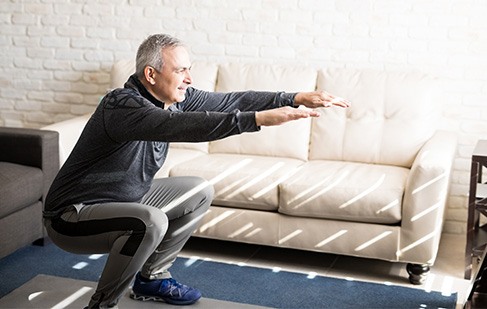If warmer weather has you motivated to start a new exercise program, the benefits you’ll reap should keep you going through every season. Exercising safely will help you get the most out of your workouts.
Exercise does more than shrink your waistline. It can reduce your risk of heart disease, type 2 diabetes, depression, anxiety, and more.
Take it slow
It can be tempting to go all-in when starting a new exercise program, but that could set you up for an injury, especially if you’ve been sedentary for a while.
Start with 15-30 minute low- or moderate-intensity sessions and gradually increase as your body adjusts to your new activity level. Aim for at least 150 minutes of exercise per week.
Technique is key
Muscle strains, ankle sprains, and tendinitis are common injuries that can occur when an exercise isn’t performed correctly. Learning how to do exercise properly can help you avoid injuries.
Try a group class with an instructor who will ensure you’re using proper form. Subtle corrections can keep you safe and make a huge difference in your results. Plus, exercise classes are a great place to meet new friends, which is also good for your health.
Hydrate
Drinking plenty of water before, after, and during exercise helps keep your body from overheating and dehydrating. Water also acts as a shock absorber in the brain and spinal cord, it lubricates joints, and it delivers oxygen throughout the body.
Not getting enough water can negatively impact your performance and increase your risk of injury. The U.S. National Academies of Science, Engineering, and Medicine recommends 124 oz. for men and 92 oz. for women each day.
Remember, you will need to boost your intake to replace the water lost during your sweat sessions. If you start to feel thirsty, you’ve already become dehydrated.
Listen to your body
Pushing through the pain may sound like a good idea; however, it can be unsafe. Shortness of breath, chest pain, dizziness, nausea, or pain that doesn’t resolve quickly is your body’s way of signaling danger.
Stop exercising and call 9-1-1 for help immediately if you have symptoms that may indicate heat stroke, heart attack, or other severe illness or injury.
Consider the climate
Exercising in a humid climate or during the heat of the day can put you at a higher risk of dehydration and heatstroke.
Instead, exercise in the morning or evening when temperatures are cooler. If possible, exercise indoors or in the shade, decrease the intensity of your workout, and wear sunscreen to protect your skin from burns.
Bottom line
Choose a workout routine appropriate for your health and fitness level to help you stay healthy and injury-free.
Low-impact exercises are gentle on your joints and safe for most people. Options to consider include walking, swimming, bicycling, barre, yoga, and Pilates. All of these activities provide cardiovascular and mental health benefits as well as weight loss.
















